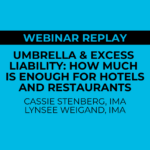You and your fellow business owners are people who have worked hard and sacrificed to achieve their dreams. There are long-term emotional effects of the past economic slowdown the pandemic caused – loyal employees have been let go, generational family businesses have been lost and business models continue to change. You have been coming up with new ways to safely run your business and keep both employees and guests safe. Add to the top of that a shortage of workers for your team and you have the recipe for disaster.
There is so much going on all at once, and in the hospitality industry, you might find yourself compartmentalizing your feelings to deliver unprecedented customer service with a smile, despite everything going on in the world.
Even before the pandemic, mental health has been a concern in the hospitality industry.
“We are dealing with an epidemic of mental illness in our industry,” said celebrity chef Cat Cora, in a story in the Wall Street Journal in early 2019.
It’s been exhausting. While you have been doing all of this work to stay afloat and keep your dreams alive, your mental health may be paying a steep toll.
Some of the symptoms you may have been feeling include anxiety, apathy, general discontent, loss of interest or pleasure in activities, mood swings or sadness. You may be irritable, restless or agitated. There are many more symptoms: please see the list at the end of this article.
If you are experiencing feelings of depression, hopelessness or even suicide, you are not alone. The National Alliance on Mental Health states that one in every five people are living with some kind of mental health condition, whether it is temporary or permanent. Please reach out for help. We’ve put together a list of resources for you to find the help you need.
National Suicide Hotline
This phone number, 988, offers 24/7 support and resources for people who are in distress. If you are having suicidal feelings, call this number now. Its website, 988lifeline.org, offers tips to manage your mental health, anxiety and stress.
Extensions:
Veterans Crisis Line: select option 1 or text 838255
Spanish Language Line: select option 2 or text “AYUDA”
Trevor Project: select option 3
Native and Strong Lifeline: selection option 4
Deaf and Hard of Hearing: for TTY users: use your preferred relay service or dial 711 then 988.
Washington State Department of Health
The state’s Department of Health website has many resources available not only for you but if you know those who may be in need of help.
Chefs with Issues
The hospitality industry takes care of its own. If you are looking for resources specific to the industry, Chefs with Issues is a private Facebook group so you can chat with people who have been in the same place as you.
Check with your insurance provider
If you have health insurance, your provider may have options for you—check their website and see what doctors are available.
National Alliance on Mental Illness
The National Alliance on Mental Illness (NAMI) offers resources in your area. Click on this link to find an organization near you.
Washington Recovery Help Line
The Washington Recovery Help Line can put you in touch with a Licensed Mental Health Professional (LMHP) in your area. If you are in need of substance abuse help, they can also put you in touch with substance use disorder treatment providers.
UnitedHealth Group
UnitedHealth Group has many resources for mental health, including a resource hub for staying mentally healthy during a crisis and Patients Like Me, a group of resources tailored to different groups of people including those in the hospitality industry.
Open Counseling
Open Counseling has options to find publicly funded mental health services in your area. If you or your employees are in need of counseling services, this site will point you in the right direction.
There is no shame in getting help for depression, anxiety or suicidal feelings. Please find the help that is right for you, your family and your employees. We will make it through this crisis—and we want all of us to be there when we do.
Symptoms of Depression
- MOOD: anxiety, apathy, general discontent, guilt, hopelessness, loss of interest or pleasure in activities, mood swings or sadness
- BEHAVIOR: agitation, excessive crying, irritability, restlessness, social isolation
- SLEEP: early awakening, excess sleepiness, insomnia, restless sleep
- WHOLE BODY: excessive hunger, fatigue, loss of appetite
- COGNITIVE: lack of concentration, slowness in activity, thoughts of suicide
- WEIGHT: weight gain, weight loss
- ALSO COMMON: poor appetite or repeatedly going over thoughts
Source: Mayo Clinic














